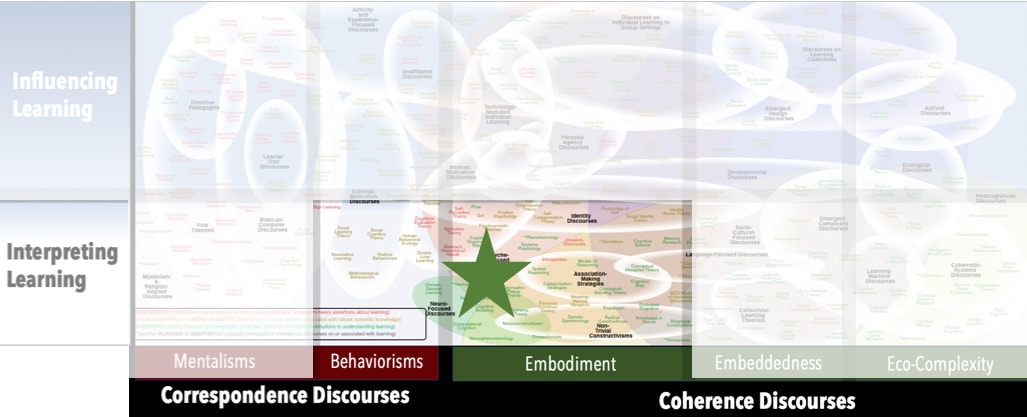AKA
Interbehavioral Psychology
Focus
Co-specifying dynamics of agent and contextPrincipal Metaphors
Drawn from and/or aligned with principles from physics (Newtonian mechanics):- Knowledge is … repertoire of behaviors
- Knowing is … mutually specified behaving (of an agent and context)
- Learner is … an organism-in-context
- Learning is … changes in behavior (to maintain fitness of agent-in-context)
- Teaching is … orienting (channeling agent’s attentions with the intention of enhancing fitness in context)
Originated
1920sSynopsis
Interbehaviorism was developed in the early-20th century, when Behaviorisms had were rapidly rising in popularity and influence. Interbehaviorism was explicitly described as complementary to Behaviorisms, but it is just as well characterized as a critique of deep-seated and uninterrogated assumptions that Behaviorisms share with Folk Theories – such as the belief that the knower in insulated and isolated from the world and that learning is about developing an internal model that matches an external reality. Interbehaviorism was thus principally articulated in terms of contrasts to Behaviorisms. For example, it rejects dichotomies (e.g., inner vs. outer, self vs. other, mental vs. behavior), problematizes mechanistic assumptions (e.g., cause–effect), and reasserts that humans have agency. In the process, the theory highlighted the reflexive interactions of the learner and the context, presaging systems-based theories of learning. Prominent associated constructs include:- Reactional Biography (Jacob Robert Cantor, 1920s) – an agent’s history of engaging with/in an environment
Commentary
While it anticipated many of the emphasis and insights of contemporary Coherence Discourses, Interbehaviorism was never broadly embraced. Many reasons for this lack of uptake have been cited, included the turgidity of the original writings, the complexity of the ideas, the denseness of the shadow cast by Behaviorisms, and the limited empirical evidence at the time.Authors and/or Prominent Influences
Jacob Robert KantorStatus as a Theory of Learning
Interbehaviorism is a theory of learning.Status as a Theory of Teaching
Interbehaviorism is not a theory of teaching. Indeed, when it was first articulated, it was seen as the antithesis of a theory of teaching in its rejection of cause–effect dynamics, That is, it rejected the simplistic but pervasive assumption that “teaching causes learning,” learning more toward the realization that learning is dependent on but not determined by teaching.Status as a Scientific Theory
Like Behaviorisms, Interbehaviorism has a significant base of empirical evidence. But unlike Behaviorisms, Interbehaviorism is explicit its orienting metaphors and its construct of “learner” – meaning that it meets the requirements of a scientific theory.Subdiscourses:
- Reactional Biography
Map Location

Please cite this article as:
Davis, B., & Francis, K. (2022). “Interbehaviorism” in Discourses on Learning in Education. https://learningdiscourses.com.
⇦ Back to Map
⇦ Back to List
